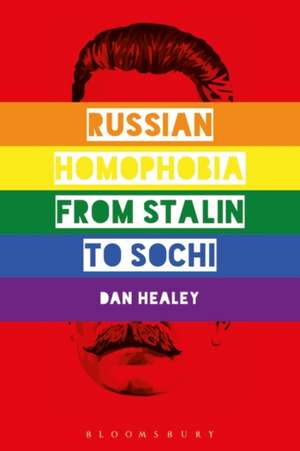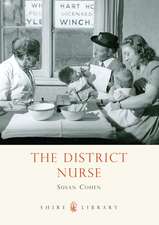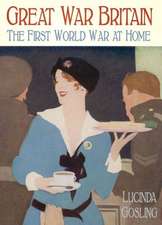Russian Homophobia from Stalin to Sochi
Autor Professor Dan Healeyen Limba Engleză Hardback – 13 dec 2017
| Toate formatele și edițiile | Preț | Express |
|---|---|---|
| Paperback (1) | 180.88 lei 6-8 săpt. | |
| Bloomsbury Publishing – 13 dec 2017 | 180.88 lei 6-8 săpt. | |
| Hardback (1) | 541.61 lei 6-8 săpt. | |
| Bloomsbury Publishing – 13 dec 2017 | 541.61 lei 6-8 săpt. |
Preț: 541.61 lei
Preț vechi: 690.87 lei
-22% Nou
Puncte Express: 812
Preț estimativ în valută:
103.65€ • 107.55$ • 86.63£
103.65€ • 107.55$ • 86.63£
Carte tipărită la comandă
Livrare economică 15-29 martie
Preluare comenzi: 021 569.72.76
Specificații
ISBN-13: 9781350000780
ISBN-10: 1350000787
Pagini: 310
Ilustrații: 18 b/w illustrations
Dimensiuni: 156 x 234 mm
Greutate: 0.61 kg
Ediția:HPOD
Editura: Bloomsbury Publishing
Colecția Bloomsbury Academic
Locul publicării:London, United Kingdom
ISBN-10: 1350000787
Pagini: 310
Ilustrații: 18 b/w illustrations
Dimensiuni: 156 x 234 mm
Greutate: 0.61 kg
Ediția:HPOD
Editura: Bloomsbury Publishing
Colecția Bloomsbury Academic
Locul publicării:London, United Kingdom
Caracteristici
Connects
Russian
homophobia
to
wider
issues
relating
to
the
history
of
memory
and
LGBT
rights
that
are
of
great
value
to
students
Notă biografică
Dan
Healeyis
Professor
of
Modern
Russian
History
at
the
University
of
Oxford,
UK.
He
is
the
author
ofHomosexual
Desire
in
Revolutionary
Russia:
The
Regulation
of
Sexual
and
Gender
Dissent(2001)
andBolshevik
Sexual
Forensics:
Diagnosing
Sexual
Disorder
in
Clinic
and
Courtroom,
1917-1939(2009).
He
is
also
the
editor
ofSoviet
Medicine:
Culture,
Practice,
Science(2010),
with
F.
Bernstein
and
C.
Burton,
andRussian
Masculinities
in
History
and
Culture(2002),
with
B.
Clements
and
R.
Friedman.
Cuprins
List
of
IllustrationsPrefaceIntroduction:
2013
-
Russia's
Year
of
Political
HomophobiaPart
I
-
Homophobia
in
Russia
after
19451.
Forging
Gulag
Sexualities:
Penal
Homosexuality
and
the
Reform
of
the
Gulag
after
Stalin2.
Comrades,
Queers
and
'Oddballs':
Sodomy,
Masculinity
and
Gendered
Violence
in
the
Leningrad
Province
of
the
1950s3.
The
Diary
of
Soviet
Singer
Vadim
Kozin:
Reading
Queer
Subjectivity
in
1950s
RussiaPart
II
-
Queer
Visibility
and
'Traditional
Sexual
Relations'4.
From
Stalinist
Pariahs
to
Subjects
of
'Managed
Democracy':
Queers
in
Moscow
1945
to
the
Present5.
Active,
Passive
and
Russian:
The
National
Idea
in
Gay
Men's
Pornography6.
'Let
Them
Move
to
France!':
Public
Homophobia
and
'Traditional'
Sexuality
in
the
Early
Putin
YearsPart
III
-
Writing
and
Remembering
Russia's
Queer
Past7.
Stalinist
Homophobia
and
the
'Stunted
Archive':
Challenges
to
Writing
the
History
of
Gay
Men's
Persecution
in
the
USSR8.
"Non-Traditional"
Lives:
The
Dilemmas
of
Queering
Russian
Biography9.
On
the
Boulevards
of
Magadan:
Historical
Time,
Geopolitics
and
Queer
Memory
in
Homophobic
RussiaSelected
Further
ReadingIndex
Recenzii
Russian
Homophobia
from
Stalin
to
Sochiis
a
stunning
accomplishment
.
Healey
shows
why
he
is
the
leading
historian
of
Soviet
sexuality
writing
today
.
Historians
of
the
Soviet
century
broadly
construed,
historians
of
sexuality
in
other
geographical
fields,
and
general-interest
readers
looking
for
a
well-researched
history
of
the
current
discrimination
in
Russia
should
all
find
Healey's
book
a
must-read.
[The] book is highly recommended to both researchers within academia and people interested in understanding contemporary Russian society.
This marvellous book should be recommended for all readers interested in Russian history and politics - and should be required reading for those who research and teach in those subjects.
Healey is a careful and imaginative historian. Each chapter deals with a different subject in gay Russian history, jumping across decades .Russian Homophobiais rich in the kind of tantalizing, upsetting detail that makes the history of sexuality so fascinating.
Healey's valuable book offers a timely contribution to Slavic studies and will be of interest to specialists and general readers alike.
Healey presents a nuanced and sophisticated analysis of how this homophobia has been shaped and maintained.
A thorough, impeccably researched portrait of persecution.
Poses some intriguing questions ... Healey manages to draw on a range of other original and surprising sources for this well-written history of modern Russia and human sexuality.
A must-read for any historian of Russian sexuality ... Highly recommended both for scholars of Russian history and queer activists who want to know more about Russia's past and present.
A valuable tool for any modern historian ... The book's universal value is in its sophisticated methodology ... [Healey] dissects and analyses archival material with the theoretical and empirical knowledge at his disposal.
This ambitious, well-sourced, eminently readable volume functions as a corrective to Western LGBTQ scholarship, which treats the sexual subjects of the Soviet Union and the Russian Federation as outliers, and as an overview of available archival material regarding the Soviet and Russian queer experience since the mid-century. Healey (Russian history, Oxford) aims to trace the origins and consequences of "modern" Russian homophobia, which he firmly roots in the Stalinist project, in a way that distinguishes it from the critiques of the postcolonial West. Summing Up: Highly recommended. Upper-division undergraduates and above; professionals.
In this meticulously researched and highly readable book, Healey draws on a lifetime of ground-breaking research on homosexuality in Soviet and post-Soviet Russia to trace the roots of Russia's antipathy towards sexual deviance from the anti-homosexual politics of Stalin to the politicisation of homophobia and 'gay propaganda' under Vladimir Putin. A fascinating insight into sexual politics in Russia.
Dan Healey's expert analysis of homophobia's history in Russia uses riveting case studies of lesbian and gay life and the law to paint a vivid picture of queerness and its persecution from the 1930s through to the Putin era. This book is essential reading for anyone who wants to understand the uphill battle for LGBTQ rights and recognition in contemporary Russia.
[The] book is highly recommended to both researchers within academia and people interested in understanding contemporary Russian society.
This marvellous book should be recommended for all readers interested in Russian history and politics - and should be required reading for those who research and teach in those subjects.
Healey is a careful and imaginative historian. Each chapter deals with a different subject in gay Russian history, jumping across decades .Russian Homophobiais rich in the kind of tantalizing, upsetting detail that makes the history of sexuality so fascinating.
Healey's valuable book offers a timely contribution to Slavic studies and will be of interest to specialists and general readers alike.
Healey presents a nuanced and sophisticated analysis of how this homophobia has been shaped and maintained.
A thorough, impeccably researched portrait of persecution.
Poses some intriguing questions ... Healey manages to draw on a range of other original and surprising sources for this well-written history of modern Russia and human sexuality.
A must-read for any historian of Russian sexuality ... Highly recommended both for scholars of Russian history and queer activists who want to know more about Russia's past and present.
A valuable tool for any modern historian ... The book's universal value is in its sophisticated methodology ... [Healey] dissects and analyses archival material with the theoretical and empirical knowledge at his disposal.
This ambitious, well-sourced, eminently readable volume functions as a corrective to Western LGBTQ scholarship, which treats the sexual subjects of the Soviet Union and the Russian Federation as outliers, and as an overview of available archival material regarding the Soviet and Russian queer experience since the mid-century. Healey (Russian history, Oxford) aims to trace the origins and consequences of "modern" Russian homophobia, which he firmly roots in the Stalinist project, in a way that distinguishes it from the critiques of the postcolonial West. Summing Up: Highly recommended. Upper-division undergraduates and above; professionals.
In this meticulously researched and highly readable book, Healey draws on a lifetime of ground-breaking research on homosexuality in Soviet and post-Soviet Russia to trace the roots of Russia's antipathy towards sexual deviance from the anti-homosexual politics of Stalin to the politicisation of homophobia and 'gay propaganda' under Vladimir Putin. A fascinating insight into sexual politics in Russia.
Dan Healey's expert analysis of homophobia's history in Russia uses riveting case studies of lesbian and gay life and the law to paint a vivid picture of queerness and its persecution from the 1930s through to the Putin era. This book is essential reading for anyone who wants to understand the uphill battle for LGBTQ rights and recognition in contemporary Russia.















